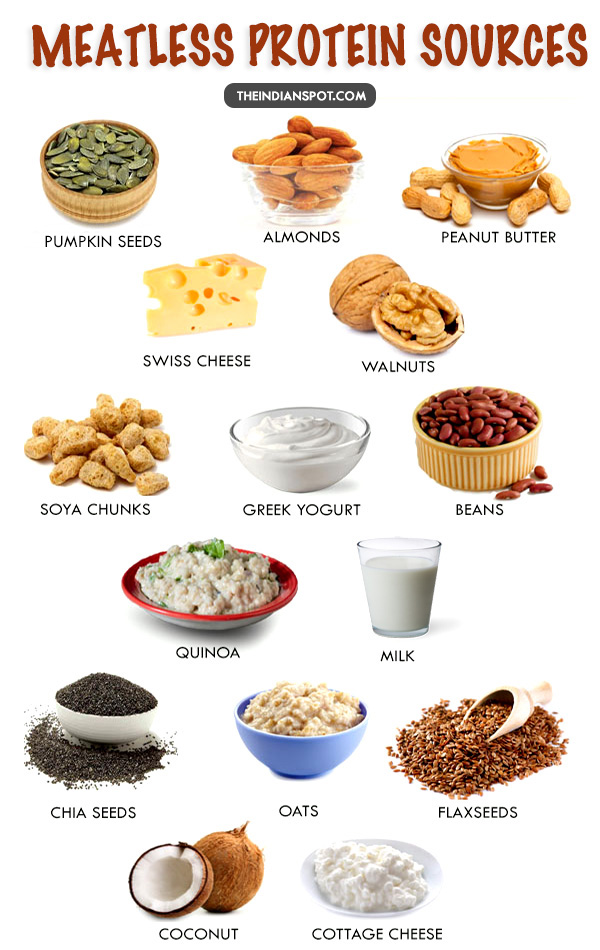We non-vegetarians get a good source of protein from our daily intake of non-veg foods like chicken, eggs etc. Meat contains a good amount of protein which is beneficial for those who workout regularly and can easily substitute protein powders with these natural sources. Vegetarians usually have to depend on protein supplements for protein but hey, there are good meatless options too! Here are the top 15 meatless protein sources:

- PUMPKIN SEEDS
Pumpkin seeds are a well-known protein source! Pumpkin seeds can be taken as snack and used as topping for salads and soups, but make sure you roast it before taking out the inner core. You can get the seeds in the season and roast them to store. Remember that these seeds are rich in calories and so the servings should be small.
- ALMONDS
Almond and other nuts can provide you with decent amounts of protein. They’ll also help keep you satisfied because they provide protein, fibre, and healthy fats. Almonds are relatively high in fat, so the general rule is to keep your total daily consumption of almonds to a handful to avoid gaining weight. More: Foods high in protein for energy and muscles.
- PEANUT BUTTER
Peanut or peanut butter, whatever you have provides your body with a great amount of protein. In your breakfast, try eating this delicious peanut butter over your toast to get extra protein of almost 8g per 2 tablespoons. This can also be used in smoothies and crackers. Also, try adding peanuts in your salads, curries, gravies etc.
- SWISS CHEESE
Swiss cheese is a protein powerhouse, but you probably won’t want to eat a 100g serving in order to meet half of your protein needs. Swiss cheese and other cheese are also a good source of calcium, so you’re not only helping to meet your protein requirements; you’re getting a good amount of calcium. More: Natural proteins to add to your smoothie.
- WALNUTS
Who doesn’t like walnuts? We all do. One-fourth cup of walnuts will add about 4.5 grams of protein to your smoothie, not to mention ample doses of heart-healthy potassium and energy-boosting magnesium. Have them as snacks throughout the day whenever you feel hungry or add them to your salads and smoothies. More: Health benefits of walnuts.
- SOYA CHUNKS
Meat alternatives that come from soy beans are complete proteins. This means they have all the essential amino acids present. A 3.5-ounce serving of soya chunks contains over 54 grams of protein. This is more than the same serving size of meat and eggs. Steam them up and add them to rice or gravies.
- GREEK YOGURT
This is low in calories and consists of almost double the protein as regular cup of yogurt. Use it as a substitute to sour yogurt and also with fruits. Almost 15 g of protein is in present in a 6oz container. More: Vegetarian protein sources.
- BEANS
Beans like kidney beans, red beans, black beans, pinto beans, chickpeas, etc. area great protein source and are low in calories too. It controls the sodium in your diet and provides 12g of protein from 1 cup. You can try many recipes with them. Usually we make dals and curries but these can also be soaked overnight, boiled and added spices to improve the taste.
- QUINOA
Quinoa is rich in protein and has very low cholesterol. A cup of quinoa can give you 8g of protein. It’s also rich in fibre and iron. Eat is as porridge or use it instead of rice.
- MILK
You get an impressive 8 grams of protein in 1 cup of fat-free milk. Milk can be an excellent replacement of water in your smoothie, besides you can add up fruits too as they complement milk very well.
- CHIA SEEDS
Chia seeds are such a powerhouse! They are full of fibre, omega-3 fatty acids, calcium and about 4 grams of protein per table-spoon. They are an easy way to add protein to your diet as they need not be grinded unlike flax seeds to get the nutrients. More: Best benefits of chia seeds.
- OATS
Every cup of oats provides 11 grams of protein. Grind them it to a thick paste and mix with apple puree and milk. Load your smoothie with an extra dose of protein with oats!
- FLAX SEEDS
Flax seeds provide 2 grams of protein per table-spoon of its powder. They can be added to your regular smoothie of any flavour to add in a nutty punch. Buy them whole for maximum shelf life and use a coffee grinder to get their full nutritional value.
- COCONUT
Coconut gratings or milk can supplement you with 5 grams of protein per cup! Add it to your smoothie instead of milk/liquid. It also adds on to the flavour.
- COTTAGE CHEESE (PANEER)
This can be a great snack which comes in reduced fat form and is also rich in calcium. ½ cup of it can give 13g of protein. You use it in creamy dishes or with vegetables and salads.